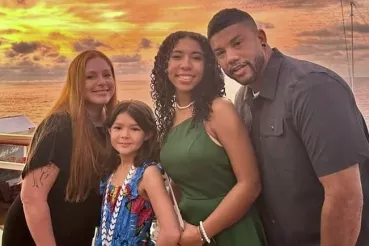Eric Chessier built his life around service to others, but when the U.S. Army veteran hit what felt like a dead-end of anxiety and depression in 2013, he needed support in return.
His doctor connected him with a program that was just taking shape at RUSH called the Road Home Program, and Chessier’s mental health improved. Nine years later, he has come full circle, joining the Road Home Program team as a community engagement coordinator and introducing others to the program he credits with launching his healing journey.
Chessier, 52, experienced many difficult circumstances before, during and after his military service that negatively affected his mental health. He frequently moved during childhood, attending seven different Chicago schools before graduating high school. After growing up with many domestic challenges, Chessier eventually decided to leave home, enlisting in the Army at 18 and serving from 1988 to 1992.
Chessier met his first wife in the Army, and the couple had three children. Despite their efforts to remain together, they were not approved for joint domicile before Operation Desert Storm separated them in 1990. Chessier was assigned to Germany, and his wife was deployed to Iraq. The resulting distance and worry were ultimately too much for their relationship to endure.
“When we returned to each other in 1992, we were two different people,” he said. “In 1994 we ended up getting a divorce. I moved back to Chicago carrying depression, anxiety, scars and hurt.”
For a while, Chessier relied on his faith and a focus on serving others to help him move forward. He was ordained as a minister in 1998 and became pastor of Cornerstone Christian Church in the West Roseland neighborhood in 2003 — a role he continues today. But the mental health challenges he faced ultimately prompted him to seek services of his own.
“When I was struggling with mental health issues, I felt off-center, but with therapy and medicine, I was able to get back to that center place,” he said of his experience receiving outpatient care at the Road Home Program.
The skills Chessier gained from his care at the Road Home Program helped him quickly identify symptoms when he needed help again in 2021 after being laid off from his job of 25 years at a school district. He sought out and received help and returned to the Road Home Program at the end of January 2022 — this time not to receive support but to provide it as a community engagement coordinator.
In this role, Chessier raises awareness of the Road Home Program and its services in Cook County, Illinois, and Los Angeles County, California, where there are high concentrations of veterans. He connects with community organizations, local politicians, churches and faith-based organizations, and other local leaders to inform them about the Road Home Program.
A significant part of Chessier’s role is working to reduce the stigma around mental health care, especially in communities of color, by sharing his story. He also draws upon his experiences as a pastor to connect with others.
“Often when we talk about getting help for mental health, we may be shunned or persecuted to a certain extent,” he said. “It’s all part of breaking down barriers and getting out the good news about resources that can help you if you have these challenges. Ministry is not comfortable. Sometimes talking about mental health is not comfortable, but to be an advocate for it is to be an advocate for those in need of these types of resources.”
Chessier’s supervisor, Ashton Kroner, veteran outreach director, said Chessier brings fresh ideas to the table and effectively connects with people who could benefit from the Road Home Program because of his experience with the program.
“If someone is on the fence like, ‘I don’t know. Do I want to give up two weeks of my life to go to this scary program all the way in Chicago?’ I’ll have them talk to Eric,” Kroner said. “He’s able to bring a ton to the table, and I’m excited to see where he is this time next year.”
Looking ahead Chessier said he wants to grow spiritually and mentally to be the best husband, father, minister and advocate for the Road Home Program that he can be. He lives in Orland Park, Illinois, with his wife, Patricia McClure-Chessier, and has five adult children.
“We have to let veterans, service members and their families know that we understand how they feel,” he said. “You don’t have to feel like something is wrong with you because you’re feeling the way you do. There’s help for you. There are resources for you. Once you get them, they can change your life for the better.”
(Photo caption: Eric Chessier served in the U.S. Army from 1988 to 1992.)




